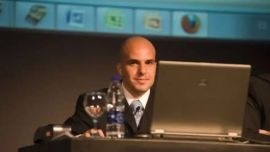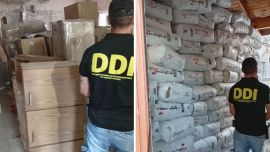The Donald Trump administration is calling on the International Monetary Fund to proceed with a new loan programme for Ecuador, paving the way for the nation to complete its debt accord with bondholders.
The current deadline for Ecuador to restructure US$17.4 billion of notes comes due September 1 and is contingent upon the IMF announcing a staff level agreement.
“Ecuador has proven that there’s the utmost political will,” Mauricio Claver-Carone, President Donald Trump’s senior adviser for the Western Hemisphere, said in an interview. “It’s a high priority in the region for us and the IMF needs to bring Ecuador over the top.”
The nation won overwhelming bondholder support to restructure its international notes earlier this month in a deal that significantly reduces the debt obligations. That’s essential for an economy that was in recession even before the coronavirus pandemic, which has since racked cities such as Guayaquil. A history of defaults – the country once went 180 years without paying a bond – has complicated efforts to obtain financing.
Claver-Carone is running for the presidency of the Inter-American Development Bank. His support for Ecuador dates back to 2018, during his stint as US Executive Director at the IMF, when he pushed for the approval of a credit line.
Election jitters
One of the lingering uncertainties surrounding the talks is the prospect of an outsider winning next February’s presidential vote. While President Lenín Moreno isn’t seeking another term, US officials are making the case that the nation will probably elect another market-friendly president who embraces an IMF-backed economic overhaul rather than someone who tears it up.
Guillermo Lasso, a former banker, is a front-runner with 17.2 percent support, according to pollster Cedatos. Otto Sonnenholzner, who served as Moreno’s vice-president, came in second at 16 percent. He has since ruled out running. The candidate tapped by former leftist leader Rafael Correa ranked third at 11.2 percent.
Correa, who was found guilty of corruption in April, is running for the vice-presidency on a ticket with ex-Central bank official Andrés Arauz.
An IMF spokeswoman said the Fund has been working closely with the Moreno government over the past few weeks on a new programme. Ecuador’s Finance Minister Richard Martínez said that talks are “making intense progress” and he hopes a deal will be completed soon.
Lasso vs Arauz
In an interview, Lasso said financing from the IMF will be important for the nation’s stability as Ecuador grapples with a rising unemployment rate. Arauz said he would support a new programme if certain conditions are met.
“We have to avoid the Argentina scenario,” Arauz said in an interview. “If the new IMF programme doesn’t limit the public policy space for Ecuador and is explicit about capital outflows and the need to preserve domestic liquidity, it’s something that would be much more reasonable.”
Last week, the leaders of Ecuador’s indigenous organisation CONAIE said they won’t run for the presidency, leaving Lasso and Arauz as the highest-profile candidates.
Lasso’s voting share could increase if centre-right supporters of Sonnenholzner rally behind him, according to Siobhan Morden, the head of Latin America fixed income strategy at Amherst Pierpont Securities in New York.
She expects Ecuador to reach a 12-month standby agreement with the IMF that includes US$1.4 billion of funding, whereas the “upside scenario” would be a three-year extended fund facility with significant front-loaded financing.
“There have been some encouraging trends this past week,” Morden said. Still, “it’s way too early for anyone to have conviction of an electoral outcome, including the IMF.”
by Ben Bartenstein, Bloomberg






















Comments